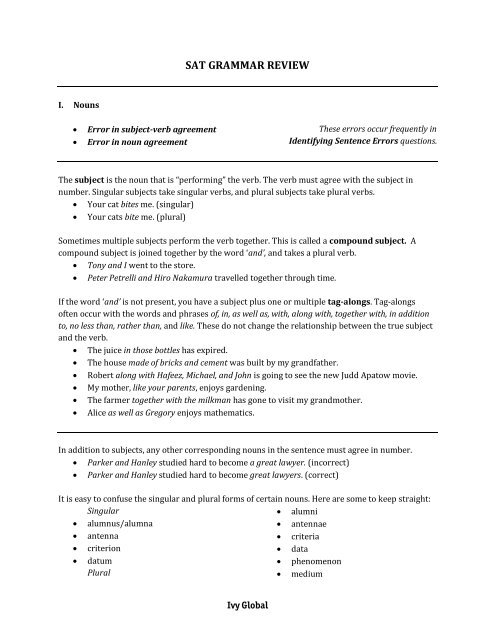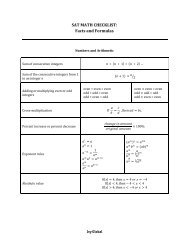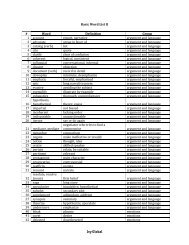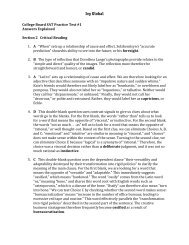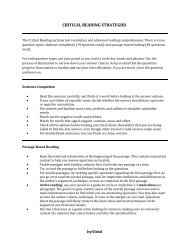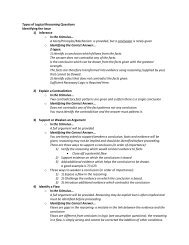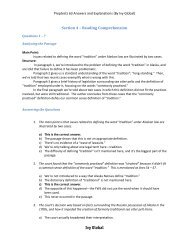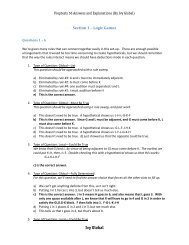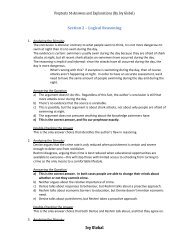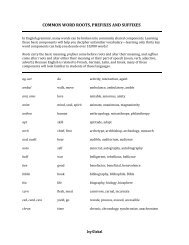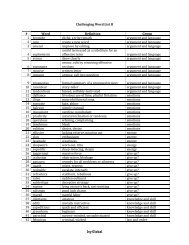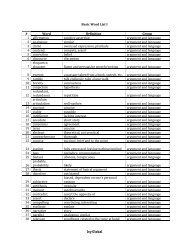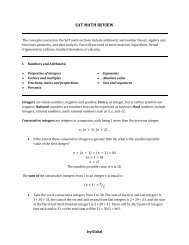Create successful ePaper yourself
Turn your PDF publications into a flip-book with our unique Google optimized e-Paper software.
<strong>SAT</strong> <strong>GRAMMAR</strong> <strong>REVIEW</strong>I. NounsError in subject-verb agreementError in noun agreementThese errors occur frequently inIdentifying Sentence Errors questions.The subject is the noun that is “performing” the verb. The verb must agree with the subject innumber. Singular subjects take singular verbs, and plural subjects take plural verbs. Your cat bites me. (singular) Your cats bite me. (plural)Sometimes multiple subjects perform the verb together. This is called a compound subject. Acompound subject is joined together by the word ‘and’, and takes a plural verb. Tony and I went to the store. Peter Petrelli and Hiro Nakamura travelled together through time.If the word ‘and’ is not present, you have a subject plus one or multiple tag-alongs. Tag-alongsoften occur with the words and phrases of, in, as well as, with, along with, together with, in additionto, no less than, rather than, and like. These do not change the relationship between the true subjectand the verb. The juice in those bottles has expired. The house made of bricks and cement was built by my grandfather. Robert along with Hafeez, Michael, and John is going to see the new Judd Apatow movie. My mother, like your parents, enjoys gardening. The farmer together with the milkman has gone to visit my grandmother. Alice as well as Gregory enjoys mathematics.In addition to subjects, any other corresponding nouns in the sentence must agree in number. Parker and Hanley studied hard to become a great lawyer. (incorrect) Parker and Hanley studied hard to become great lawyers. (correct)It is easy to confuse the singular and plural forms of certain nouns. Here are some to keep straight:Singular alumni alumnus/alumna antennae antenna criteria criterion data datum phenomenonPlural medium<strong>Ivy</strong> <strong>Global</strong>
millenniumsymposiumphenomenamediamillenniasymposiaII. PronounsError in pronoun caseError in pronoun-antecedent agreementError in pronoun-verb agreementError in pronoun consistencyThese errors occur frequently inIdentifying Sentence Errors questions.Pronouns are words that take the place of and refer back to previously mentioned antecedentnouns. Like their noun counterparts, pronouns can take a subject or object role in the sentence.Each personal pronoun has a nominative (subject) and objective (object) case. She and I went to the store. (nominative)Nominative Objective Jerry took him and me to the dance. (objective)ImeweusIf you’re unsure, test with a single pronoun.youyouhehimWho is a subject pronoun, and whom is an object pronoun.sheher Who went to the store? (nominative)itit Whom did Jerry take to the dance? (objective)theythemwho whomPronouns that come after a preposition (by, of, for, after, with,between, except, without, etc.) are considered objects of the preposition and take the objectivecase. Everyone did well on the exam except him and her. Sarah left without John and me. Please keep this between you and me. By whom was this wonderful short story written?Constructions with than: whenever a pronoun follows than, it should be in the subjective case. Afollowing verb is always understood, if not always articulated. I am taller than he (is). Sarah is better at math than I (am).Pronouns must agree in number with their antecedents. If the antecedent is singular, the pronounmust be singular. If the antecedent is plural, the pronoun must be plural. A student will catch their mistakes if they proofread. (incorrect)<strong>Ivy</strong> <strong>Global</strong>
A student will catch his or her mistakes if he or she proofreads. (correct)Students will catch their mistakes if they proofread. (correct)Verbs must agree in number with subject pronouns. It is easy to make a mistake with some of theless basic pronouns. When in a subject position, some of these pronouns always take a singular verband others always take a plural verb. Each of the apples you bought is bruised.Singular Pronouns Everything that my uncle does turns out to be a success.eacheither Neither of the twins knows how to cook.neither someone Nobody is at home.anyone everything Many are cold, but few are frozen.somebody nobodyanybody everyoneException! In neither … nor and either … or constructions, theverb agrees in number with the closest noun or pronoun. Neither the twins nor Laura was willing to take the blame. Either Mary or her parents are responsible for the flood.Plural PronounsmanyfewseveralKeep pronouns consistent. Don’t change between “we,” “you,” “they,” “he or she,” and “one” in asingle sentence. If one doesn’t study, your grade will drop. (incorrect) If one doesn’t study, one’s grade will drop. (correct)III. VerbsError in verb tenseError in verb form or conjugationMisuse of passive voiceError in gerund usageThese errors occur frequently in bothIdentifying Sentence Errors andImproving Sentences questions.The tense of a verb indicates when the action of the sentence takes place. Use the present tensefor action that is currently occurring, action that generally occurs, and action that takes place inliterature (novels, movies, comics, short stories, poetry, non-fiction books, etc). I always eat breakfast at home. In Shakespeare’s play, Macbeth murders Duncan after he hears the prophecy.There are several ways to indicate action that occurs in the past. Use the regular past tense forcompleted actions in the past. Use the imperfect past tense (was + present participle) for actionsthat were continuous in the past.<strong>Ivy</strong> <strong>Global</strong>
I ran.He drank.She swam.I was running.He was drinking.She was swimming.Both the regular and imperfect past tense can be combined for actions that were simultaneous inthe past. Connect these with words like as, when, and while. I was swimming when my cell phone rang. She broke her arm while skating.The perfect tense (have + past participle)describes an action that you have done in the past, butare talking about in the present. Yes, she has seen that movie. I have walked one hundred miles and I will walk one hundred more…The pluperfect or past perfect tense (had or had been + past participle) describes action thatoccurred before another action in the past. Do not leap into the past perfect tense when one of youractions occurs in the perfect, present, or future tense. I will not go with Sohana because I had already seen the movie. (incorrect) I didn’t go with Sohana because I had already seen the movie. (correct) Chris had already read the book, but he will read it again. (incorrect) Chris had already read the book, but he decided to read it again. (correct)To describe a hypothetical action in the past tense, use would rather than will. I knew that I will win the game. (incorrect) I knew that I would win the game. (correct)Use the subjunctive tense (formed by the past tense were) to express wishes, particularly with theword if. If I was you, I would take a vacation. (incorrect) If I were you, I would take a vacation. (correct)Transitive verbs take a direct object. Intransitive verbs take an indirect object or no object at all.Certain verbs can be both transitive and intransitive without changing form or conjugation: I am reading a book. (direct object) I am reading. (no object) He made an error. (direct object) He made the man cry. (indirect object)Certain verbs look similar, but have very different forms depending on whether they are transitiveor intransitive. Raise and lay (present tense) take direct objects. Rise and lie do not take directobjects. However, lay can also be the past tense of lie. The past tense of lay is laid. Jill raises her hand. I lay my coat on the bed. They raised their children well. I laid my coat on the bed.<strong>Ivy</strong> <strong>Global</strong>
A dependent clause on its own is a sentence fragment, and needs to be altered to make a completesentence. When I finished this slice of pizza. (sentence fragment) I finished this slice of pizza. (complete sentence) Because I detest Sarah. (sentence fragment) Because I detest Sarah, I try to avoid her whenever I can. (complete sentence)Independent causes can be separated by periods, connected by semicolons, or joined bycoordinating conjunctions. If you try to connect two independent clauses with only a comma, youhave a comma splice. If you try to connect them with nothing, you have a run-on sentence.The teacher is very angry I think he is going to call myCoordinating Conjunctionsfriend’s parents. (run-on sentence)andorThe teacher is very angry; I think he is going to call mybutnorfriend’s parents. (correct)soforIt was a beautiful day outside, I didn’t want to stay in andyetdo homework. (comma splice)It was a beautiful day outside, so I didn’t want to stay in and do homework. (correct)I finished the slice of pizza, I felt my stomach turn. (comma splice)After I finished the slice of pizza, I felt my stomach turn. (correct)An independent and a dependent clause can be joined together using a subordinatingconjunction. In this construction, one idea depends on the other. Coordination and subordinationtest our ability to see logical relationships between ideas. Thus, wemust understand and determine how the ideas in the clauses workSubordinatingtogether: does one give supporting or contrasting information? IsConjunctionsafter rather thanthere a progression in time and sequence? There might be two oralthough sincemore ways to express the relationship, but often only one will beasso thatcorrect, clear, and concise.as ifthan It was snowing, but I wore my boots. (incorrect)as long as that Because it was snowing, I wore my boots. (correct)as though though Henry tried to read War and Peace in the original Russian,and it was too difficult. (incorrect)becausebeforeunlessuntil Henry tried to read War and Peace in the original Russian,but it was too difficult. (correct)even ifeven thoughwhenwhenever Although Henry tried to read War and Peace in the originalRussian, it was too difficult. (correct)ifif onlywherewhereasin order that whereverHowever, consequently, furthermore, therefore, instead, thus, as aresult and similar words are conjunctive adverbs and cannot beused in the same way as coordinating or subordinatingnow thatoncewhile<strong>Ivy</strong> <strong>Global</strong>
conjunctions. They can be used to introduce an independent clause following a period or asemicolon. They can also act as interrupters, separated from the main sentence with commas. John didn’t read the assigned homework, consequently he failed the exam. (incorrect) John didn’t read the assigned homework. Consequently, he failed the exam. (correct) We decided not to go out tonight, instead we are going to save our money. (incorrect) We decided not to go out tonight; instead, we are going to save our money. (correct) Sarah is normally clumsy, however she is a good skater. (incorrect) Sarah is normally clumsy; she is, however, a good skater. (correct)Semi-colons are used in only two contexts: to join two independent clauses with or without aconjunctive adverb, or to separate very lengthy items in a list. Use a colon to introduce examples oritems in a list. Four people worked on the project; only one received credit for it. (correct) Victoria was frequently tardy; therefore, she received a low grade. (correct) Elaine has three daughters; Amy, Michaela, and Christine. (incorrect) Elaine has three daughters: Amy, Michaela, and Christine. (correct) Elaine has three daughters: Amy, who is studying law at Harvard; Michaela, who is workingas a masseuse; and Christine, who is still in high school. (correct)As we have seen, commas are used to join together two clauses with a conjunction. Commas arealso used after introductory phrases and around interrupters (words, phrases, and clauses thatinterrupt and are not essential to the core meaning of the sentence). Commas should never comebetween a subject and its verb. Mary, decided to relax with a good book. (incorrect) Mary decided to relax with a good book. (correct) After a long day at work, Mary decided to relax with a good book. (correct) Mary a paediatrician really enjoys her work. (incorrect) Mary, a paediatrician, really enjoys her work. (correct)Apostrophes are used to form contractions by taking the place of a missing letter or number; toform plurals of letters, figures, and numbers; and to indicate ownership with an ’s. To form apossessive for a noun already ending in s, add ’s if the noun is singular; add only an apostrophe ifthe noun is plural. Keep in mind that not all plural nouns end in s. Show possession in the last wordfor names of organizations and businesses, for hyphenated words, and for cases of joint ownership. We’re going out of town next week. (contraction) My husband was in the class of ’89. (contraction) My street address contains three 5’s. (plural of a number) She has a hard time pronouncing r’s. (plural of a letter) The drummer’s solo was fantastic. (singular possessive)<strong>Ivy</strong> <strong>Global</strong>


